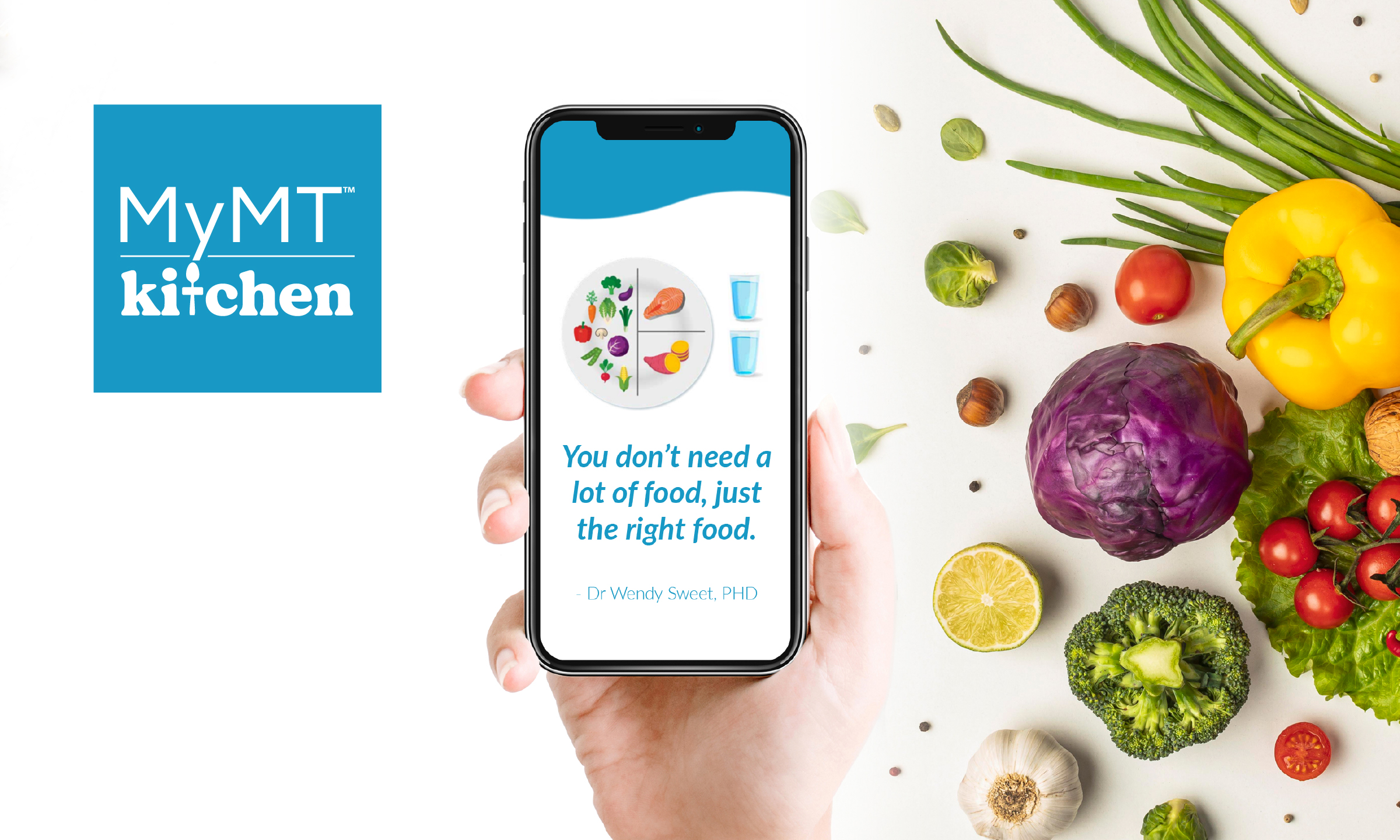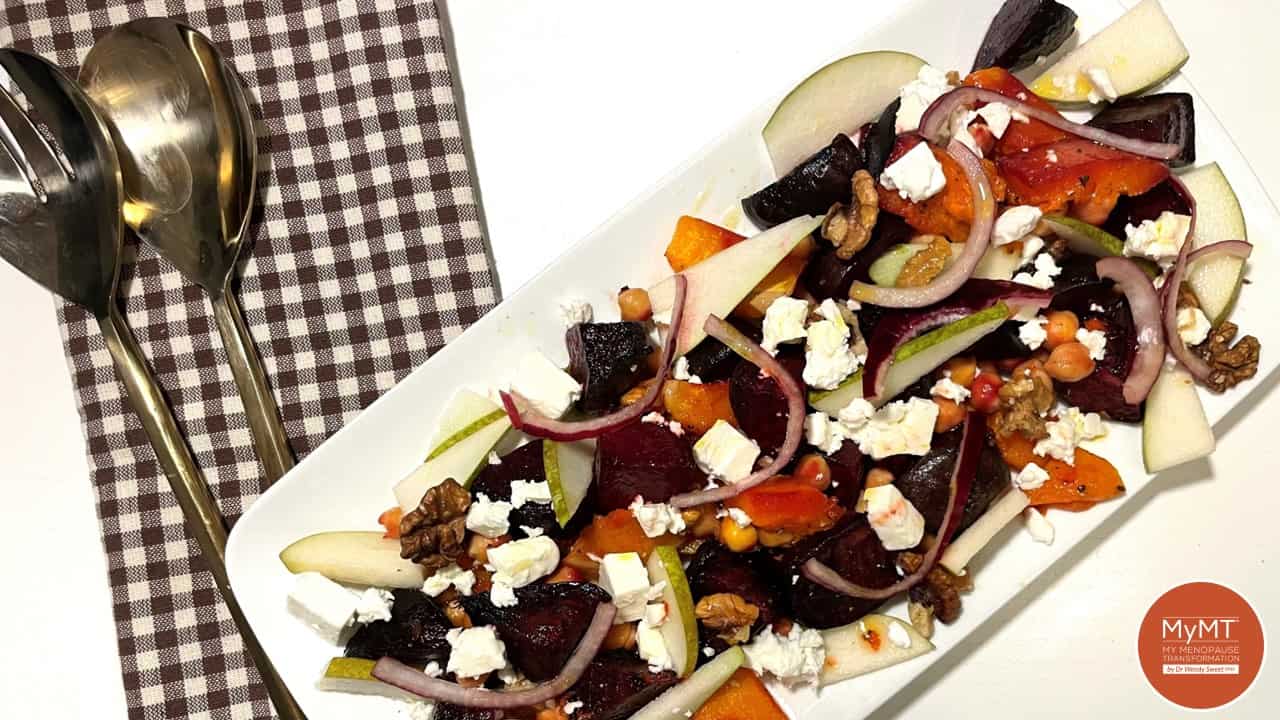In 2012, I was teaching nutritional papers at a university in New Zealand and came across a study that was perfect for my lectures on lifestyle behaviour change at the time.
This week, whilst looking for academic information on lifestyle behaviour change to share with the Health Practitioners on the CPD courses, I remembered this particular study.
I was thinking about it as I looked at this delicious recipe and reflected on how, when I was so overwhelmed with my symptoms during menopause, I didn’t know that there were certain foods that are beneficial to turning around our menopause symptoms and helping us to lose our menopause weight.
These foods are also important for women’s health as they age. They meet the compounds required to not only reduce inflammatory changes which arrive during the menopause transition, but they also have compounds which are evidenced to help reduce vascular or arterial stiffness, thereby, improving heart health.
These foods include:
- Beetroot (or Beets): improves nitric oxide which helps to reduce blood pressure. (Clifford et al, 2015)
- Pumpkin: contains natural pumpkin oil as well as Vitamin A, which help to reduce bladder irritability. (Nishimura et al, 2014)
- Walnuts: helps to improve melatonin (sleep hormone) production (Verde et al, 2022)
- Feta Cheese: high in calcium and supports bone health.
- Extra Virgin Olive Oil: contains compounds which improve women’s cardiovascular health and joint function. (Franconi et al, 2020)
But back to the weight loss study. Published in Switzerland (Freund & Hennecke, 2012), the intent of the study was to explore the role of changing weight loss rationale and mindset towards the process-goal of ‘changing eating behaviour‘ compared to just focusing on the outcome goal of ‘losing weight‘.
The results on 126 overweight women were very clear. Developing and maintaining a process focus was related positively to daily success in dieting, as well as to actual weight loss. Furthermore, when the study participants kept a process focus, they had fewer deviations from their diet.
In contrast, the outcome focus for the control group of participants who just had an end goal of ‘weight loss’, had a negative impact on their successful dieting. This group also had more deviations from the diet.
It is well known that changing one’s eating behaviour is challenging. I think that this is especially so for women in their midlife years. Not only are habits for food shopping and cooking well ingrained, but so too are the meanings that women give to these habits.
The meanings that we give to our habits and routines around food and food preparation, is how our eating behaviour and routines become highly habitualised. For many midlife women with families to cook for, our food choices are often based on the needs of others and not ourselves.
But if we can think about process goals, such as changing our eating behaviour, as the study alluded to, and we also consider ‘why’ we want to change our food choices, then ‘change’ itself is easier.
Thinking about reducing inflammation and improving menopause symptoms and improving our health as we age using food as our medicine, is a great starting point. So too, is adding in process goals to help us get to where we want to get to.
Process goals make changing our diet that much easier and getting started means finding recipes that are delicious and filling. By doing this, you can start to change your eating behaviour each and every day.
Every single ingredient in this fabulous recipe is beneficial to your midlife health. I wanted to share it with you in the MT™ Kitchen recipe page today in the hope that you too, will use food as your medicine, whether you are reducing your midlife weight, or want to improve your menopause symptoms.

Warm Beetroot and Pumpkin Salad with Feta, Pear and Walnuts
Serves 2 as a main or 4 as a side
- 2 large beetroot
- Half a butternut pumpkin
- Half a can of chickpeas
- 1/4 of a red onion
- 1/4 cup red wine vinegar
- 1/4 cup of water
- 1 pear
- A handful of walnuts
- 1/3 of a block of feta
- 2 oranges
- 45ml olive oil
Method (serves 4 as a side)
- Pre-heat oven to 180 degrees Celsius, bake.
- Prepare the pickled onions. Add the red wine vinegar and water to a jar, and leave the onions to soak.
- Chop up beetroot and pumpkin and place in a baking tray with a dash of olive oil. Lightly salt and pepper the veggies. You are going to leave these in the oven until they are soft (about 45 minutes). At 30 minutes, give them a stir and add the chickpeas in.
- Prepare the dressing, chop the walnuts, feta and the pear.
- Add everything to a bowl and serve. Bon apetit!

References:
Clifford T, Howatson G, West DJ, Stevenson EJ. The potential benefits of red beetroot supplementation in health and disease. Nutrients. 2015 Apr 14;7(4):2801-22. doi: 10.3390/nu7042801.
Franconi F, Campesi I, Romani A. Is Extra Virgin Olive Oil an Ally for Women’s and Men’s Cardiovascular Health? Cardiovasc Ther. 2020 Apr 24;2020:6719301. doi: 10.1155/2020/6719301.
Freund AM, Hennecke M. Changing eating behaviour vs. losing weight: the role of goal focus for weight loss in overweight women. Psychol Health. 2012 Oct;27 Suppl 2:25-42.
Nishimura M, Ohkawara T, Sato H, Takeda H, Nishihira J. Pumpkin Seed Oil Extracted From Cucurbita maxima Improves Urinary Disorder in Human Overactive Bladder. J Tradit Complement Med. 2014 Jan;4(1):72-4. doi: 10.4103/2225-4110.124355.
Verde, A., Míguez, J., Leao-Martins, J. Gago-Martínez, A., & Gallardo, M. (2022). Melatonin content in walnuts and other commercial nuts. Influence of cultivar, ripening and processing (roasting). Journal of food composition and analysis, 105, 104180. doi: 10.1016/j.jfca.2021.104180

